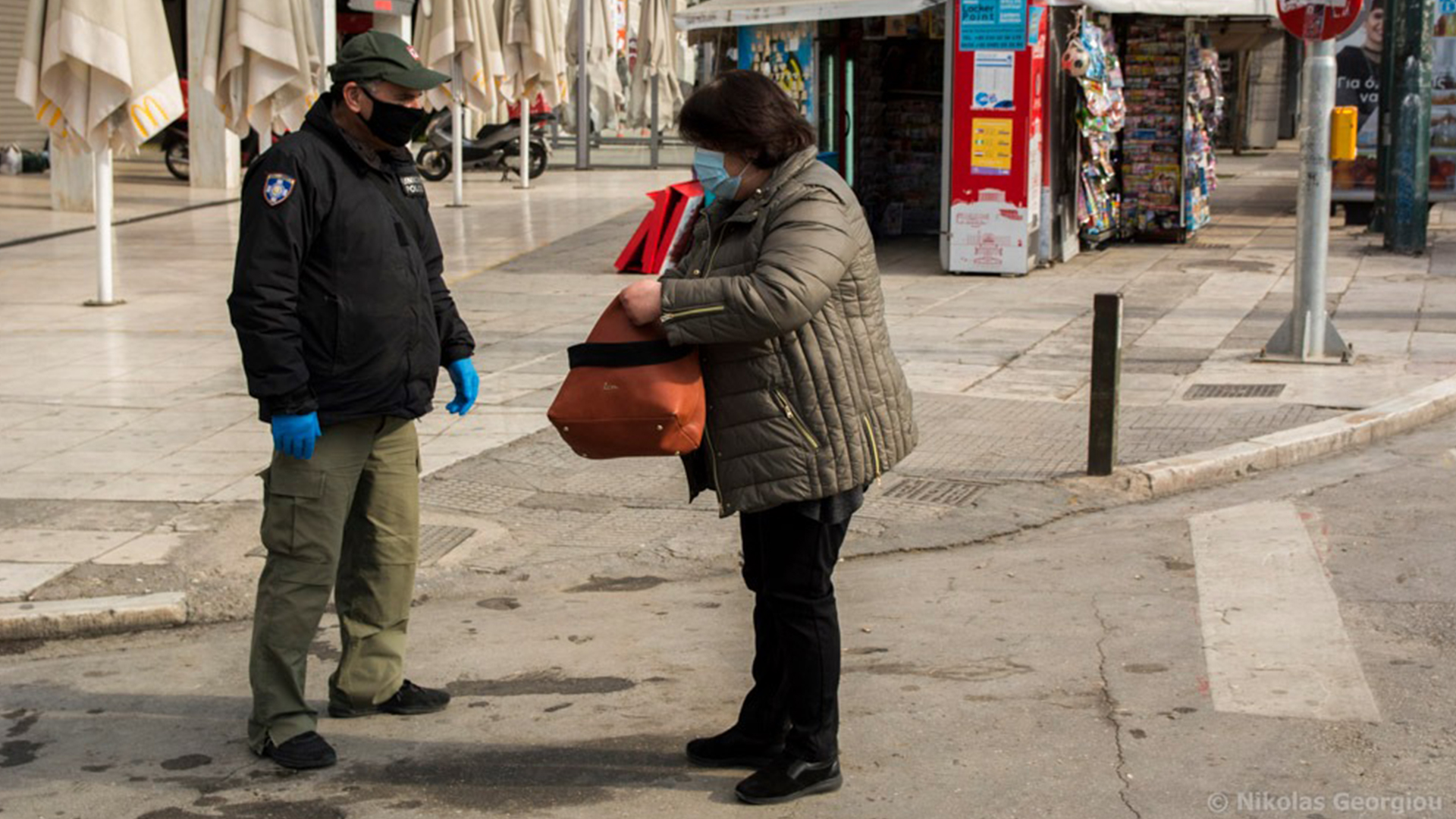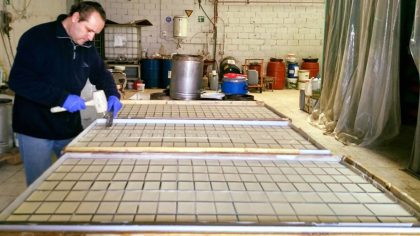A Country Quarantined: Coronavirus in Greece, Part 1
Athens, Greece – While their regional neighbor Italy is throttled by the coronavirus pandemic, the country of Greece has been enduring strict quarantine measures, resulting in relatively low numbers of infections. Since the shutdown there’ve been nearly 2,500 confirmed COVID–19 cases with 130 deaths.
During this crisis, Greece, like many countries across the world, has seen rife inequalities illuminated within their society. Unicorn Riot spoke with writer and activist Panagiotis Koustas, who’s living in Chania, Crete, about some of the impacts the pandemic is having on Greece. This is part one in a series on coronavirus in Greece.
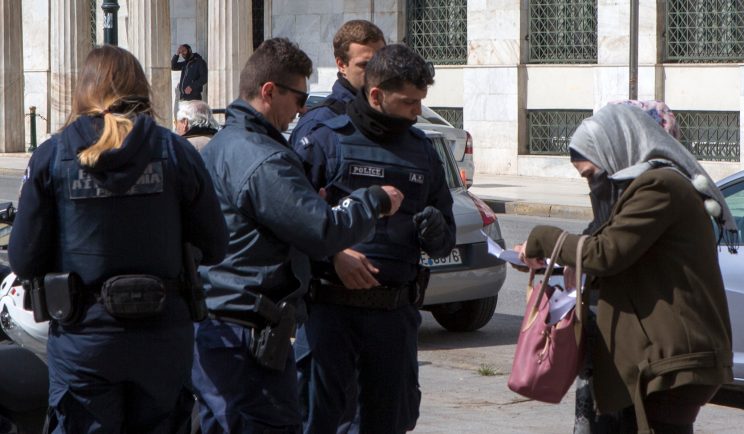
Unicorn Riot: Is there any controversy with how the police are enforcing the orders?
Panos: You bet there is. There is systemic racism going on in Greece towards Roma people and other groups within society, like trans people, people with disabilities, addiction or mental problems, immigrants, etc. And as you already know from previous issues Unicorn Riot covered, there is also a part of the police force (no one really knows how big in numbers of policemen) that is straight fascists and supporters of the neo-Nazi Golden Dawn party.
Also a lot of the rest of the policemen are very fond of authoritarian tactics during their everyday practice. On top of that they are really scared of the virus, since no one has been informing them properly. All of the above create an extreme — and rather dangerous — mixture.
A few days ago the income of the fines for the state was over 5,000,000 euros. If you split that to 150 euros per fine, you can get the idea. And everyday we get reports of people that got the ‘magic paper’ for technicalities (like some kind of wrong filling-out of the form) or for absolutely no reason (like immigrants waiting in the line for a soup kitchen, keeping the proper distance).
No one can really tell if all of this is some kind of instructions given to the police force by the authorities (both police and political), their own way to interpret their role, or even a way to take advantage for their all-time unpopularity within the Greek society. What is really ‘funny’ is that these fines are clearly unconstitutional and there is no law to cover them. They are considered some kind of traffic tickets, which is absurd.
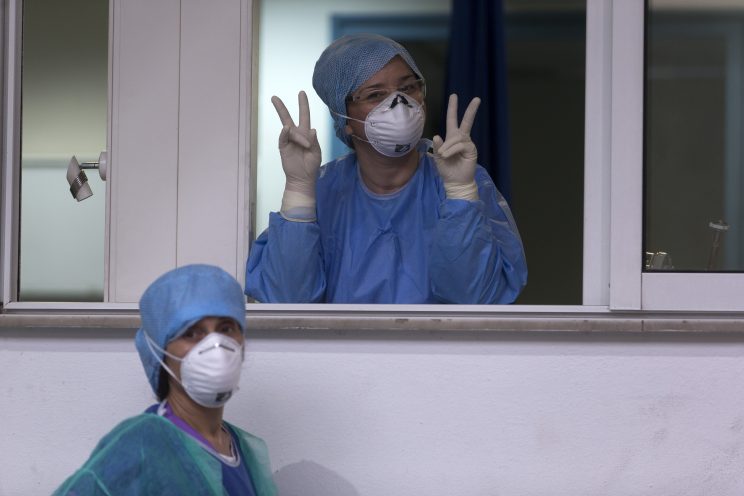
Unicorn Riot: Is there adequate testing and how are the healthcare workers dealing with things? I read 5,000 workers volunteered* to help during the pandemic?
Panos: No, the testing remains rather small to the general population. The health workers are mostly unprotected and worried. There are a lot of reasons for that.
First of all, the public health care system has been under-financed for many years, because both of the neo-liberal approach on health care and the lack of funding during the ‘Greek Crisis’ period. The staff, doctors and nurses, are rather old; young healthcare workers tend to work abroad — not by choice, they remain unemployed in Greece. So the ‘heroic narrative’ that the government officials tried to pull (really out of their ass) in the beginning of the lockdown is certainly not going well for them at all.
On April 7, there were a lot of actions around hospitals and health care units all over Greece — not traditional demonstrations because of the pandemic, but alternative forms of struggle — demanding funding, tests for all and so on.
Public health workers in Greece are highly influencing the society these days and its union impact is rather strong. By a happy coincidence that would take too long to explain here, their leadership is rather militant and not the ‘usual Greek’ type of union leaders.
On the last part of your question, I don’t think that the state-run ‘volunteer program’ is getting a lot of momentum, like the one we had for the Athens Olympics in 2004. Self-organized initiatives get a better response on that, as they address the problem at its core, in a local and easy-to-control level, and have proven helpful all the past years.
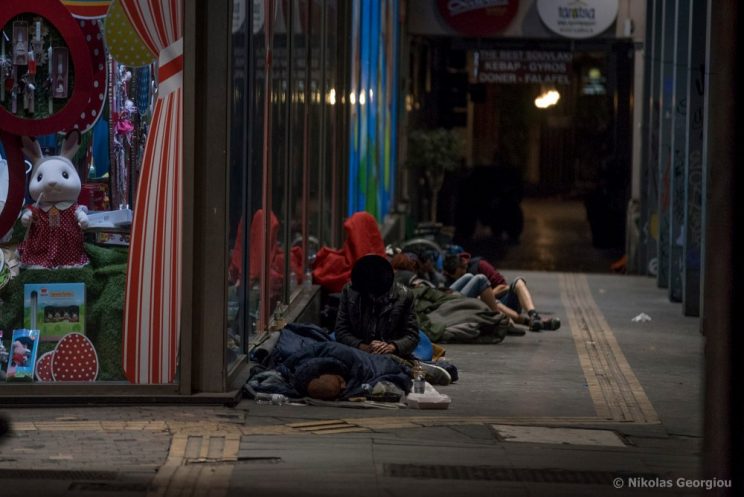
Unicorn Riot: How are the Greek people dealing with these orders to stay home? For those who’ve had to stay at home for several weeks now, like yourself, how is it impacting your, and others, life?
Panos: Well, not happy, that’s for sure. But the truth is that the reporting on the Italian Tragedy, and the early cases in Kastoria and Ilia, made the majority of the people reconsider their stance. So, I would say that (this time) most of the society worked the ‘unknown equation’ forced upon them, rather well. Much better than what I would expect, anyway.
And this is the second time Greek society has proven better than my view of it. The first was in the summer of the big refugee wave. On the other hand, the more this set of rules are applied, the more this long-established distrust between the people and the State will appear, in my opinion.
We have talked about this phenomenon in the past, if you remember. There is no real trust of officials in Greece; almost everyone believes that they work on their own motives and for their own good. This is not a steady basis to form a common goal, despite the “we are all in it together” propaganda. Well, we are not.
This system excludes by default the poor and the ‘different.’ And although not everybody is poor, everybody feels different in Greece. So, it’s a matter of how long this shitty situation is going to last.
As for me, and the impact on me, I just have much more work to do on a non-paid basis. Which is something I am used to, quite well.
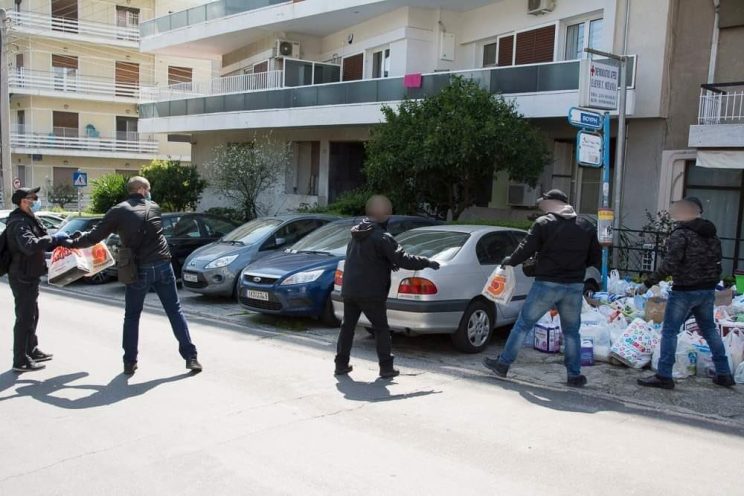
Unicorn Riot: How are vulnerable people being supported? I saw that Rouvikonas has handed out quite a bit of supplies to nursing homes — is mutual aid common during this crisis?
Panos: If they don’t have a family to support them, they are fucked up. Nursing homes is a tragedy in Greece, because of the many different forms this field has. There are church-run nursing homes; private-run nursing homes for profit; and non-profit nursing homes (with a board of directors and unclear, state-like foundations). Same applies to other vulnerable people, like persons with disabilities. No one really controls this mess and the quality of the care varies a great deal.
Mutual aid is upgrading day by day; after all, solidarity is our weapon. We have the know-how and the willingness to ‘go for it,’ every time that ‘philanthropists’ are too scared to do something or churches show their true colors by suspending their soup kitchens, like they did here in Chania.
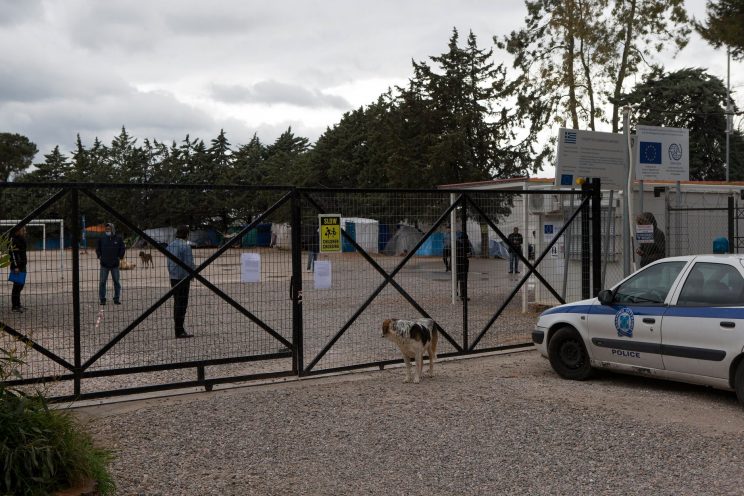
Unicorn Riot: Thousands of refugees are now fenced in under quarantine at Camp Ritsona and Malakasa and more to come. What is the situation with the refugees? What’s happening now at the Turkish/Greek border?
Panos: They remain in tragic conditions, and moreover, their right to apply for asylum is suspended. Also, speaking about systemic racism, the New Democracy government suspended their ability to have health care as soon as it took office. And of course now they try to give them back some kind of ‘temporary health care’, but this is taking too long.
Their human rights are violated every day, every hour, every minute. It is a crime against humanity, and on that field the Greek society as a whole (with some exceptions) is also guilty.
There are reports of ‘good Greek citizens’ that pick up the phone to call the police every time they see immigrants walking οn the street. They watch from their windows or balconies just to report — this is probably the lowest stage a human being can achieve.
As for the last part of the question, according to friends I have on the Greece-Turkey borderline, there is not much going on anymore.
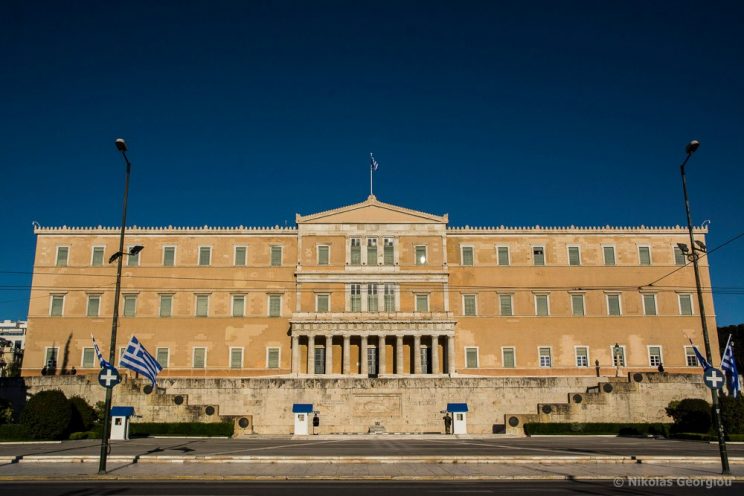
Unicorn Riot: Is this affecting Turkish and Greek relations? What are the internal impacts of this politically? Is there any oppositional groups responding to this crisis?
Panos: Well, some analysts here consider the coronavirus a savior on the latest Greek-Turkish episode. But this is a soap opera played for as long as I live. I really can’t tell who the director is, but it has a lot of executive producers.
If you mean the ‘party war’ in the parliament, it’s the same bad theater play, just played worse — ‘all under the same flag’ shit.
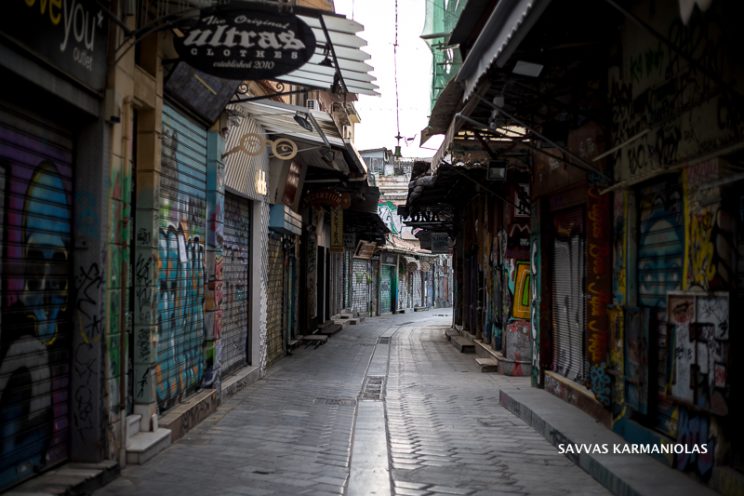
Unicorn Riot: With the economy seemingly recovering before the crisis, how is COVID–19 impacting on Greece’s economy?
Panos: ‘Seemingly’ is a very good word to describe the situation before. Well, now it’s a disaster but… there is more to come, on a global scale. So, to me, fuck the Greek economy.
I consider David Harvey’s analysis on this recent article quite possible, and this article by Arundhati Roi really putting the question mark where it should be. The first projects a type of crisis unseen before and with all the tools to ‘fix’ it, already-used in the previous period. The second asks if we are willing to move to a new era for humanity by dragging behind us all the dead weight of the capitalism or if we are determined to travel lightly and see what’s going on.
Well, you know me, I am a light traveler for a long period now.
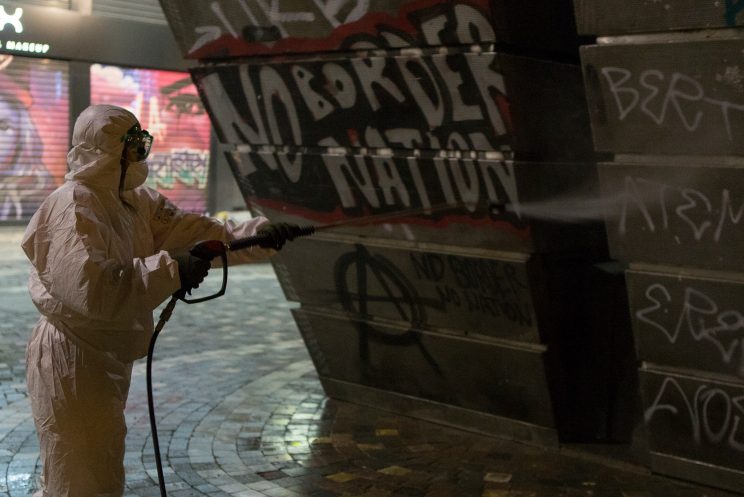
Unicorn Riot: Is there anything else you want to say?
Panos: Just a few words for comrades. We spent a great period of our lives trying to work and to exist in small cracks of the system. For days or even moments, in small squats, on little or bigger squares, in tiny places compared to a world filled of ‘normality’ — a killing normality, a struggling normality, an unfair, murderous, unhealthy normality for every creature on earth.
What we experience now is not a crack; it is a hole. It is a chasm. We need to think out of the box, even our own little precious common box of ideas.
In order to live, profit and exploitation should stay on the side of the world we leave behind.
Cover image of woman having her movement papers checked in Athens in mid-April 2020 via Nikolas Georgiou.
Worker-Occupied Factory Sends Soap to Refugee Camp – Coronavirus in Greece, Part 2
Mutual Aid to Detained Refugee Women Grows — Coronavirus in Greece Part 3
Follow us on X (aka Twitter), Facebook, YouTube, Vimeo, Instagram, Mastodon, Threads, BlueSky and Patreon.
Please consider a tax-deductible donation to help sustain our horizontally-organized, non-profit media organization:

Unicorn Riot’s COVID–19 Coverage:
Unicorn Riot's Specials From Greece [2018-2021]:
- Greece: New Education Bill Brings a New Students Movement - May 29, 2021
- Greek Police Occupy and Desecrate Memorial Site of Teen They Killed - December 8, 2020
- Historic Squats, Rosa Nera and Terra Incognita, Raided by Greek Police - September 9, 2020
- Shots Fired at Squatted Social Center in Exarcheia, Athens - August 30, 2020
- Mutual Aid to Detained Refugee Women Grows — Coronavirus in Greece Part 3 - May 7, 2020
- Worker-Occupied Factory Sends Soap to Refugee Camp – Coronavirus in Greece, Part 2 - April 28, 2020
- A Country Quarantined, Coronavirus in Greece Part 1 - April 25, 2020
- Greek Government Cuts Power to Worker-Run Factory in Midst of Pandemic - March 30, 2020
- Passing the Point of No Return: Interview with Rouvikonas Anarchist Collective - December 24, 2019
- Attacks on Capitalist Targets on the Rise as Greek Police Increase Violence - December 23, 2019
- Government Deadline of Greek Squat Evictions Draws Near - December 4, 2019
- Greek Police Raid Squats and Evacuate 269 Refugees, Community Symbolically Reoccupies Spirou Trikoupi 17 - September 21, 2019
- 143 Refugees Arrested as Greek Police Begin Exarcheia Raids - August 27, 2019
- OmniaTV, Grassroots Independent Media in Greece - August 14, 2019
- Life-Sentence Overturned for Greek Police Officer that Killed Teenager - July 30, 2019
- Occupy, Resist, Produce: Inside the Self-Managed Factory of Vio.Me. - Apr 16, 2019
- Workers Healthcare Center of Vio.Me., Created by the Workers for the Community - Apr 16, 2019
- Greece: Political Prisoners Pt. 3 – Criminalized by Association - Feb 7, 2019
- Major Clashes Mark 10 Years Since Greek Police Killing of 15 Year Old Alexis - Dec 9, 2018
- Athens Prepares for 10th Anniversary of Teenager’s Death by Police - Dec 6, 2018
- Heraklion’s Autonomous Open Market Generates Solidarity Economy - Nov 23, 2018
- Occupied Urban Gardens Grow Community, Stunt French Gentrification - Nov 21, 2018
- Greek Police Attack Anarchists After Demo for Victims of 1973 Student Uprising - Nov 18, 2018
- Reports From Greece – 13 Part Series – 2017
